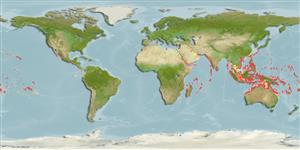Common names from other countries
Klassifizierung / Names
Namen | Synonyme | Catalog of Fishes(Gattung, Arten) | ITIS | CoL | WoRMS | Cloffa
Environment: milieu / climate zone / depth range / distribution range
Ökologie
seewasser riff-verbunden; tiefenbereich 3 - 120 m (Ref. 11890), usually 3 - 20 m (Ref. 90102). Tropical; 30°N - 28°S
Indo-Pacific: Red Sea to the Line and Mangaréva islands, north to Ryukyu Islands, south to southern Great Barrier Reef and Austral Islands.
Size / Gewicht / Alter
Maturity: Lm ? range ? - ? cm
Max length : 12.0 cm TL Männchen/unbestimmt; (Ref. 11441)
Rückenflossenstacheln (insgesamt): 8; Rückenflossenweichstrahlen (insgesamt): 9; Afterflossenstacheln 2; Afterflossenweichstrahlen: 8. Distinguished by having the following characteristics: dorsal fin rays VII-I, 9; anal fin rays II, 8; pectoral fin rays 14; pelvic-fin rays I, 5; pored lateral line scales 23; total gill rakers 16-17, developed gill rakers 10-12; circumpeduncular scales 12; predorsal scales 4; body depth 3.0-3.4 in SL (Ref. 93839). Basicaudal spot is centered slightly above the level of the lateral stripe (Ref. 37816). Further characterized by pinkish to pale grey body color; narrow, tapering midlateral stripe; caudal fin base with dark spot that barely touches lateral line on its lower edge (Ref. 90102).
Found under ledges or among isolated coral heads in silty inner reef areas (Ref. 1602). Solitary and rather rare (Ref. 559). Nocturnal species (Ref. 7300). Often found at base of coral outcrops or under ledges (Ref 90102). Feeds on fishes and invertebrates (Ref. 89972). Maximum depth reported taken from Ref. 128797.
Life cycle and mating behavior
Geschlechtsreife | Fortpflanzung | Ablaichen | Eier | Fecundity | Larven
Mouthbrooders (Ref. 240). Distinct pairing during courtship and spawning (Ref. 205).
Myers, R.F., 1991. Micronesian reef fishes. Second Ed. Coral Graphics, Barrigada, Guam. 298 p. (Ref. 1602)
IUCN Rote Liste Status (Ref. 130435)
CITES (Ref. 128078)
Not Evaluated
Bedrohung für Menschen
Harmless
Nutzung durch Menschen
Mehr Information
ReferenzenAquakulturAquakultur ProfilZuchtlinienGenetikElectrophoresesVererbbarkeitKrankheitenVerarbeitungMass conversion
Tools
Zusatzinformationen
Download XML
Internet Quellen
Estimates based on models
Preferred temperature (Ref.
115969): 25.3 - 29, mean 27.8 (based on 786 cells).
Phylogenetic diversity index (Ref.
82804): PD
50 = 0.5312 [Uniqueness, from 0.5 = low to 2.0 = high].
Bayesian length-weight: a=0.01175 (0.00706 - 0.01957), b=3.08 (2.93 - 3.23), in cm Total Length, based on LWR estimates for this species & (Sub)family-body (Ref.
93245).
Trophic level (Ref.
69278): 3.7 ±0.60 se; based on food items.
Widerstandsfähigkeit (Ref.
120179): hoch, Verdopplung der Population dauert weniger als 15 Monate. (Preliminary K or Fecundity.).
Fishing Vulnerability (Ref.
59153): Low vulnerability (10 of 100).
